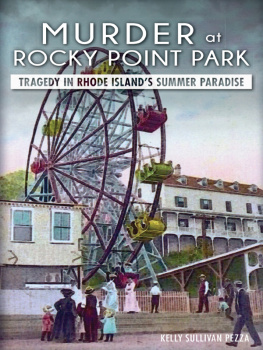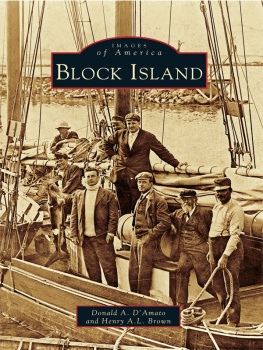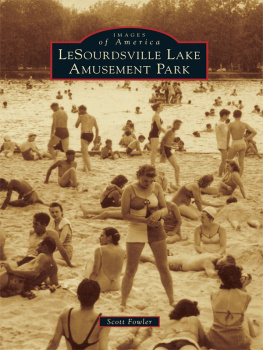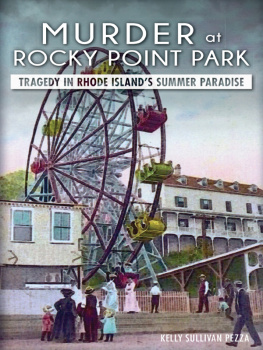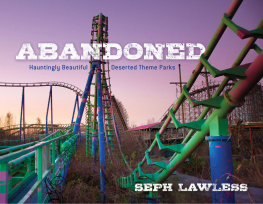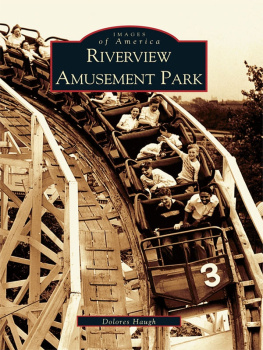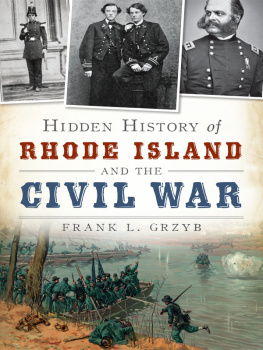
Published by The History Press
Charleston, SC 29403
www.historypress.net
Copyright 2014 by Kelly Sullivan Pezza
All rights reserved
First published 2014
e-book edition 2014
ISBN 978.1.62585.160.4
Library of Congress Cataloging-in-Publication Data
Pezza, Kelly Sullivan.
Murder at Rocky Point Park : tragedy in Rhode Islands summer paradise / Kelly Sullivan Pezza.
pages cm. -- (True crime)
print edition ISBN 978-1-62619-625-4 (paperback)
1. Murder--Rhode Island--Warwick--History--19th century. 2. Rocky Point Park (Warwick, R.I.)--History--19th century. I. Title.
HV6534.W475P49 2014
364.1523092--dc23
2014025440
Notice: The information in this book is true and complete to the best of our knowledge. It is offered without guarantee on the part of the author or The History Press. The author and The History Press disclaim all liability in connection with the use of this book.
All rights reserved. No part of this book may be reproduced or transmitted in any form whatsoever without prior written permission from the publisher except in the case of brief quotations embodied in critical articles and reviews.
For my babies, Tatiana Maryhelen Pezza and Josef Roland Pezza.
I love you.
CONTENTS
ACKNOWLEDGEMENTS
I am eternally grateful to Greg Pezza, Marylou Fiske, Helen and Roland Baton, Page Sullivan, Mary McCrea and A.J. Nausch of Pawcatuck; the staff and patrons of the Bottom Line Bar in Warwick; Mark Sand of Mystic; the wonderfully helpful staff at the Warwick Town Hall; Kathleen Madrid, Carol Graziano, Steve Grimes, John Davis, Katherine Lowenstrom, Larry Webster, Hope Andrews, Charlie Wright, Lorraine Arruda, Jane Mahoney, Eric White, Matt Wunsch and the staff of Southern Rhode Island Newspapers; Pam Lavoie of Jules Antiques & General Store; and my beautiful children, who taught me how much love the human heart is capable of holding.
INTRODUCTION
From my days as a child, accompanying my grandfather to dusty antique stores or tagging along behind my mother as she did gravestone rubbings, I have been enthralled by history. From this early age, it was instilled in me to have a great love and respect for all things past.
My interest in true crime cannot be as easily explained. Perhaps it is the same adrenalin-inducing addiction that caused my great-grandfather to lose himself in detective novels or that led my grandfather, and later myself, to become involved in law enforcement. When I found it difficult to choose between pursuing my interest in true crime, devoting myself to my love of history or taking advantage of the literary ability I had been given, I luckily found a way to combine all three.
Seventeen years ago, I began working as a newspaper journalist, writing a weekly column on historic local crimes and unsolved mysteries. This necessitated poring over old records, letters, diaries and newspapers for hours every night. On one particular evening, I ventured to the library at the University of Rhode Island to go over its old newspaper collection, in the hopes of finding a lead on a new article. I had been browsing over the reels of microfilm for only a few minutes when my eyes began to hurt, and I decided that Id locate just one page of interesting material, print it out and call it a night. The moment I noticed an old article bearing the name of a local town alongside the word murder, I printed out the page without even reading it. I figured it might be interesting or it might not, but I would read it the next morning after my headache had departed.
When my rested eyes later moved over the words on the paper, I realized I didnt have the makings of an article. I had the foundation of a book. The story was shocking, and as a historian, I was amazed that Id never heard it before. A local man had bludgeoned his little girl at everyones favorite Rhode Island amusement park. There had been thousands of articles and stories written about the park; why had none of them ever mentioned Maggie Sheffield?
My ensuing research was not easy, not only because the case received very little news coverage and a fire had allegedly burned most of the official records, but also because I found it hard to remain professional. Over the years, I had researched hundreds of murdersterrible, sickening, unspeakable murders. But like a doctor must keep a professional distance from his patients, I had always been able to keep myself from having any emotional feeling toward the people I wrote about. This time, I couldnt do that for some reason.
I was kept awake at night by visions of Maggie in my head, of her last moments and what they must have been like for her. It filled me with despair to write about this child and try to come to terms with the fact that I would never know what she had been thinking as she looked up at her father that day. I could only imagine, and it pained me to imagine it. Very unprofessionally, I cried for Maggie more than a few times.
As I always do when writing about someone deceased, I went to see Maggies grave. Kneeling there at the small stone engraved with the name Maggie Segur Sheffield, I swallowed the lump in my throat and reached out to touch it. She was only six feet away from methis innocent child I had researched, written about, ached for, cried over. She was right here. And this was as close as I could ever get to her.
My connection with Maggie was unlike any I had ever experienced with a research subject before. I felt angered that there seemed to have been more concern for Frank Sheffield than there had been for his daughter. Reporters had not been horrified enough to report on the case any more than necessary, and the memories of her seemed to be extinguished almost as quickly as her life was. I felt driven, more than one hundred years later, to tell her story, her whole story, to make certain her life and death are never forgotten. Perhaps my endeavor was to create the mournful feeling of loss that should have been felt at the time of her unspeakable death.
I know that I will never forget her. In my memory, she is safe. When I returned to visit her grave for a second time, I left for her the last thing she ever asked for in her earthly life. At Rocky Point that fateful day, she had requested that her father give her his handkerchief so that she might tie it into the shape of a doll. Beside a dozen pink carnations, I placed a doll against her gravestone. Sleep peacefully, angel, I whispered. Your story will be told.
THE MURDER
I Have Killed My Daughter
All the laughter and gay chatter of the massive crowd drifted on the salt air toward the ledges. However, strangely, those sounds seemed to be enveloped somewhere in the center of the music. It was not too far in the distance that carousels and flying swings and roller coasters and train rides rang with the melody of barrel organs.
Closer by, there was only one sound that seemed real, and that was the gentle sound made by the rippling water that lapped against the slippery rocks, slapping them softly before quickly retreating back and dispersing into the vast Atlantic Ocean.
The gaiety and the cheerful din, the music and the ocean, what was real and what was not real all swirling together in amplified chaosthis is what Frank Sheffield heard for a moment. Then he bent down and picked up a large rock that had crumbled from the tall, jagged ledge behind him. He turned to face his five-year-old daughter. The next sound he heard was a scream.
Two young couples, sitting on a knoll not far from the ledge, had been enjoying the beautiful summer day there at Rocky Point Amusement Park in Warwick, Rhode Island. They were immediately startled by the chilling sound that had come from the other side of the ledge, shattering the peaceful atmosphere. One of the boys, Arthur Skirron, quickly got up and rushed toward the area from which the scream had come. When he was about halfway there, Frank came out from behind the ledge, looked at Skirron and then kept right on walking without uttering a single word.
Next page
